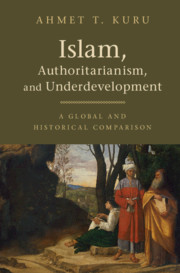'In these pages can be found a grand solution to a grand problem - nothing less than The Islam Question, that is, why one religion is prone to violence, authoritarianism, and economic underdevelopment. Kuru sets out to refute the two most publicly prominent positions on this question, essentialism and post-colonialism, by unearthing centuries of political and economic development in Islam and discovering that its contemporary problems result from shifts in religious and political authority of many centuries past. In this courageous and compelling piece of scholarship, Kuru does for religion what great historical sociologists like Barrington Moore and Theda Skocpol did for democracy, dictatorship, and social revolution.'
Daniel Philpott - University of Notre Dame
'Generations of thinkers have puzzled over why the Muslim world, once intellectually creative and commercially vibrant, fell behind economically and came to symbolize repressive governance. In this meticulously researched, insightful, and provocative book, Ahmet T. Kuru attributes these interlinked transformations to complex alliances between religious officials and states. Islam, Authoritarianism, and Underdevelopment will captivate scholars in many disciplines, and also the broader public interested in Islam’s intellectual, political, and economic roles through the ages.'
Timur Kuran - Duke University, North Carolina
'Ahmet T. Kuru offers a nuanced interpretation of the links between Islam and authoritarianism, in which the religion is not the culprit, but complex socio-political developments are to be blamed for the near-failure of Islamic societies to develop democracy and an innovative economy. His historical analysis sheds new light on a highly important and sensitive debate, and helps us to understand better the deep roots of the Islamic Sonderweg.'
Jan Luiten van Zanden - Universiteit Utrecht, The Netherlands
'In this far-ranging and original book, Ahmet T. Kuru explores just how it came to pass that the Muslim Middle East in the modern period experienced a dramatic decline in cultural and political dynamism relative to the societies of Western Europe. The question is one that has preoccupied comparative politics and historiography for more than a century. But no scholar has explored the issue with the sociological richness, comparative erudition, or depth of insight Kuru achieves in this book. This is one of the most important works in years on the politics and culture of Muslim modernity, and one that literally transforms the state of our knowledge.'
Robert W. Hefner - Boston University
‘This volume is well suited for anyone interested in the Middle East, the Islamic world, or political and development theory.’
J. Alkorani
Source: Choice
'Kuru … undertakes an ambitious and, on balance, successful analysis of the ills of the authoritarianism, economic backwardness, and religious violence that plague 49 Muslim-majority states.'
John Waterbury
Source: Foreign Affairs
'[Kuru’s] central point concerning the damage caused by the entanglement of religious and political actors is a fresh and convincing perspective in a debate that has become circular and stale.'
Claire Sadar
Source: Ahval
'[Kuru’s] book is a must-read study for anyone interested in political science, history and various other social science branches … I must stress the exhaustiveness of this book’s bibliography.'
Ahmet Erdi Öztürk
Source: Democratization
‘This book conveys a refreshing and nuanced historical analysis which emphasizes that understanding the historical roots of these problems leaves us better equipped not only in comprehending their full extent, but also in solving them.’
Therese Sefton
Source: Journal of Peace Research
'Kuru’s new book is a ground-breaking history and analysis of the evolution of the state in Muslim countries. Thoroughly researched and accessibly written.'
James M. Dorsey
Source: New Books Network
'Without doubt, Kuru’s book is a must-read study and a pivotal source.'
Abdelaziz El Amrani
Source: Hespéris-Tamuda
‘… an excellent work. Rich in details with academic vigor, the book will find its place on the shelves of various disciplines. Kuru’s engaging style makes the reading a rewarding, joyful experience.’
Mustafa Gurbuz
Source: Arab Studies Quarterly
‘Ahmet Kuru has done an amazing job of navigating through the academic minefield with aplomb in answering some of the questions that many even would not dare to pose. This book is undoubtedly one of the best I have read for some time. Kuru’s work should be lauded and be part of essential reading for many areas of pedagogy.’
Dipak K. Gupta
Source: Terrorism and Political Violence
'Islam, Authoritarianism, and Underdevelopment is a tour de force that lays out the broader context for the failures of the contemporary Muslim world and the ways in which religion can shape political outcomes.'
A.Kadir Yildirim
Source: Perspectives on Politics
'A magnum opus; it appears to be a product of painstaking inquiries, enormous bibliographical research, nuanced historical comparisons, and interdisciplinary analyses.'
Serhan Tanrıverdi
Source: Turkish Studies



